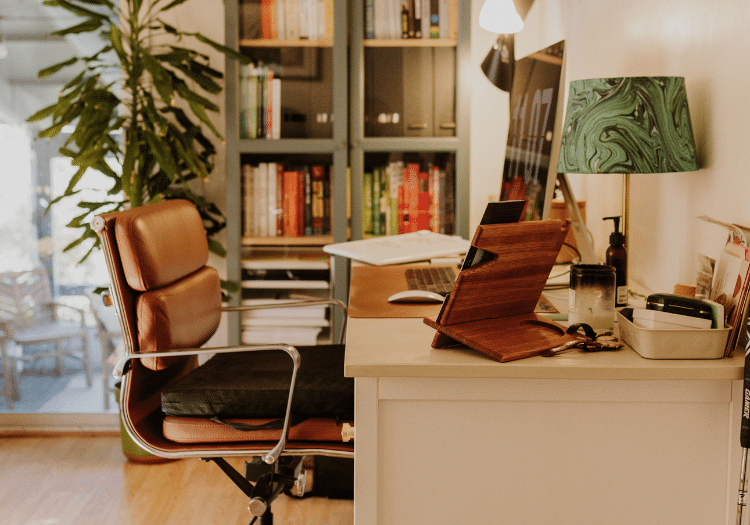What Can I Deduct for My Business? Home Office Expenses Made Simple

Posted on: January 8, 2025
We get it—at some point or another, we’ve all stared at that coffee receipt, new desk chair, or sky-high phone bill and wondered, “Can I write this off?” It’s a question we hear all the time.
The short answer? Anything that has a legitimate business-related purpose can be deducted.
This rule of thumb makes understanding home office expenses pretty simple. But here’s the catch: when there’s a personal element involved, things get a little tricky. These are what we call “mixed use deductions”—those expenses that blur the line between business and personal. They’re often overlooked for this reason, because frankly, they can be a little confusing.

So, let’s clear the air. We’ll walk you through the most common mixed use deductions, what you can claim (and how much), and the key things to watch out for. We also answer questions such as: What home office expenses can I deduct? How much can I deduct? No confusion, no headaches—just clear answers regarding business use of home expenses to help you maximize savings and keep more hard-earned money in your pocket. Let’s get started.
Home Office Deductions Eligibility
Working from home? That doesn’t automatically mean you can start deducting. The Canada Revenue Agency (CRA) has two criteria, and you must meet at least one of them.
- Principal Place of Business: Your home must be your business location.
- This is the case for many small business owners. For example, if you don’t rent an office space and conduct all your business operations from home, you can claim a portion of your home expenses. If you do have an office space, that is more than likely considered to be your main business location; therefore, this criterion would not be met.
- Exclusive Use for Business & Regular Client Meetings: The space must be used solely for business purposes and regularly for meeting clients, customers, or patients.
- This is much stricter. If your “office” is also your dining table, you don’t qualify. And no, Zoom calls don’t count—CRA has been clear that virtual meetings don’t meet the requirement for “client meetings” in your home office space. Learn more about virtual meetings here.
What Home Office Expenses Can I Deduct?
1. Property Expenses
If you use any of these for business purposes, you can claim a reasonable percentage (defined below) of:
- Utilities (electricity, heat, water)
- Rent (if you’re renting)
- Mortgage interest (not the principal portion of payments)
- Home insurance
- Property taxes
- Repairs and maintenance
How much can I deduct? The key here is reasonable percentages based on the size of your home office relative to your entire home.
For example: If your office is 100 square feet, and your home is 1,000 square feet, you can deduct 10% as a home office expense.
For repairs and maintenance, you can claim this reasonable percentage one of two ways:
- Claim a reasonable percentage derived from the total expenses (of your entire home).
- Claim 100% of those expenses specific to your office space.
2. Cell Phone Expenses
We live on our phones—emails, social media promotions, scheduling apps, you name it. But before you write off your entire phone bill, know this:
Only the business portion is deductible. You need to determine what percentage of your cell phone usage is for business.
For example: If 70% of your calls, apps, and data usage are business-related, you can claim 70% of your phone bill as part of your home office expenses. However, if you have a designated office phone (one that sits on your home office desk), that is 100% deductible.
⚠️ Important: The cost of the phone itself (device fees) is not immediately deductible as part of your bill. Instead, if the phone is used primarily for business, it can be claimed as a business asset and falls under “capital cost allowance” (CCA), meaning you can deduct its cost over time.
Does this sound a little overwhelming? The one thing you don’t want to do is miss out on savings because you’re too busy. We can take this stuff off your plate so you can focus on your business – just click here to get started.
3. Internet Expenses
Like your cell phone, home office internet expenses are also partially deductible. The business portion is based on usage, not square footage.
For example: If 50% of your internet usage is for business (emailing clients, Zoom meetings, managing your website), then 50% of your internet bill can be claimed as a home office expense.
4. Meals and Entertainment Expenses
This one can be tough because many different rules apply. However, the basic rule of thumb is:
If it’s for a business purpose—clients, prospects, or employees—you can deduct 50% of meal and entertainment costs. Personal meals (those not business-related) are not deductible.
✅ Allowable deductions examples (for meals and entertainment):
- Taking a client out for lunch
- Employee appreciation dinners
- Networking meals with prospects
⚠️ Important: Write down the purpose of the meal on the receipt and keep it. CRA wants to see why the meal was business-related. For example: “Client meeting with John Smith, ABC Ltd., to discuss project scope.” Failing to do this may result in CRA denying the expense.
Note: You can expense golf fees within your business, but you cannot take a tax deduction on it. So yes, you are paying tax, but the corporate tax rate is likely much less than the personal tax rate, so it is still beneficial for you to expense it.
5. Vehicle Expenses
Using your car for business? You’ve got two options:
- Per-Kilometer Allowance (Corporations only)
- If you’re incorporated and an employee of your own company, you can reimburse yourself based on reasonable per-kilometre rates. This amount is deductible to your corporation and not taxable to you personally.
- Keep a logbook tracking the date, distance travelled, destination, and business purpose.
- Actual Expenses (Sole Proprietors and Others)
- You can claim actual expenses, like fuel, insurance, repairs, and maintenance, based on the percentage of business use.
⚠️ What’s NOT Deductible: Driving between your home and primary business location (like commuting to an office). However, driving to client meetings, job sites, or courses does count as business-related and therefore can be claimed as a home office expense.
What Can I NOT Deduct?
Some expenses feel business-related but don’t qualify:
- Clothing: Unless it’s specialized (e.g., safety gear, steel-toed boots), regular clothes like suits or jeans aren’t deductible—even if you “need them for work.”
- Medical Expenses: These can’t be claimed as business expenses, but there are alternative options like Health Spending Accounts (a topic for another day).
- Home-to-Work Travel: Driving to your regular business location isn’t deductible, no matter how long your commute.
Click here for a comprehensive list of eligible expenses from CRA.
Track Mixed-Use Expenses Like a Pro
- Use the Right Bank Account:
- Pay exclusively business expenses from your business bank account.
- For mixed-use expenses (like cell phones or utilities), pay from your personal account and calculate the business portion to report later.
- Track expenses on a spreadsheet – you’ll be thankful you did.
- Keep Receipts & Records:
- Write the business purpose directly on receipts (especially for meals and entertainment).
- Hold on to records for the CRA’s prescribed time frame (typically six years).
- Maintain a Mileage Log:
- If you claim vehicle expenses, track each business trip’s date, purpose, and kilometres travelled.
- Use Software Tools:
- Apps like MileIQ for mileage or Expensify for receipt tracking can make your life way easier.
Tax Deductions for Home Office: Final Thoughts
Mixed-use deductions might feel like small potatoes, but those percentages add up over time. Whether it’s your home office, cell phone, or meals, the key is to:
- Keep it reasonable.
- Track it properly.
- Separate business-only expenses from mixed-use ones.
At the end of the day, claiming legitimate deductions isn’t just about saving money—it’s about running a smarter, more efficient business. Knowing all available home office tax deductions can save you a ton of money long-term and making the effort to understand business use of home expenses makes you a more savvy business owner.
Have questions about specific deductions or need help tracking expenses? Our team of CPAs can ensure you’re claiming everything you’re entitled to—without crossing any lines. Because the only thing better than running a business you love is keeping more of what you earn.
Contact us today to get started.